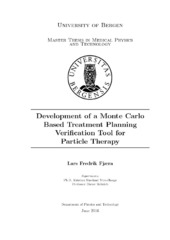| dc.description.abstract | Radiation therapy is an important component of cancer treatment. The favorable characteristics of proton radiation open the possibility of conforming the treatment dose to the target volumes and sparing of the surrounding healthy tissue. Pencil beam scanning is the current state of the art treatment method for delivering proton therapy. Accurate delivery of the prescribed radiation dose in a cancer patient, requires precisely calculated dose distributions. Commercial treatment planning systems (TPS) must compromise in the level of accuracy in order to compute the radiation plans in a reasonable amount of time. This trade-off can be considerable, especially in heterogeneous regions or in the case of metallic implants. Monte Carlo (MC) simulations are currently the gold standard in dose calculation. The FLUKA MC Code is a general purpose MC tool that enables recalculation of dose distributions and verification, in addition to more detailed studies not feasible in a TPS or other more specific MC codes. All treatment plan information is contained in a common format (DICOM), which must be adapted to be readable for most MC tools, including FLUKA. In this project, a tool that translates treatment plan information into data readable for the FLUKA code was developed. The tool includes several routines based on Python scripts. It enables reading of relevant treatment plan settings required to automatically generate a FLUKA simulation file for dose recalculation. Functions for data analysis and visualization, as well as comparison between the TPS and FLUKA results were also created. In addition, scripts for converting a FLUKA calculated dose distribution into DICOM format were created. The results in this work demonstrate the feasibility of FLUKA MC recalculation of TPS generated dose distributions through the developed software. Treatment plans for both water phantoms and for actual patients were successfully recalculated in FLUKA. The FLUKA doses were also exported to DICOM files and can be imported back into a TPS for dose evaluation. The results further stress the importance of detailed information and calibration to the specific beam line for obtaining clinical precision of the recalculation process. This developed and tested tool is a contribution to software that enables MC treatment plan verification and can further be implemented in proton and particle therapy TPSs. Furthermore, the tool enable detailed studies of the dose distributions, including linear energy transfer (LET) and secondary particle production. Such tools are essential in radiobiological modeling. | en_US |
